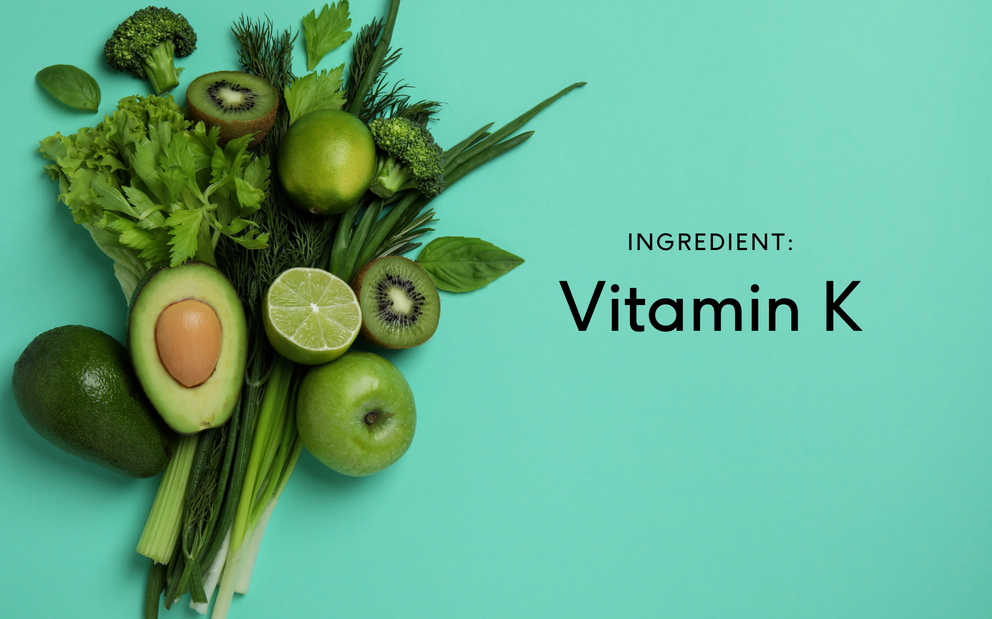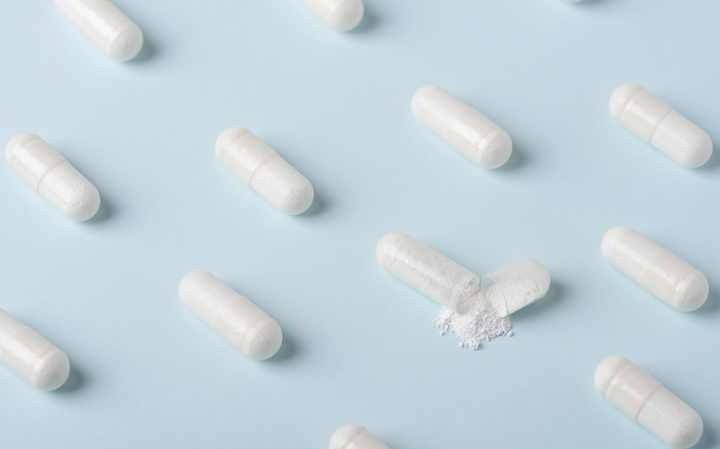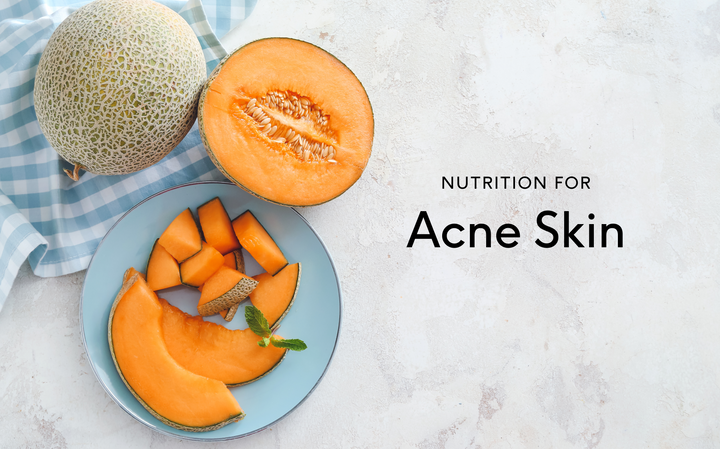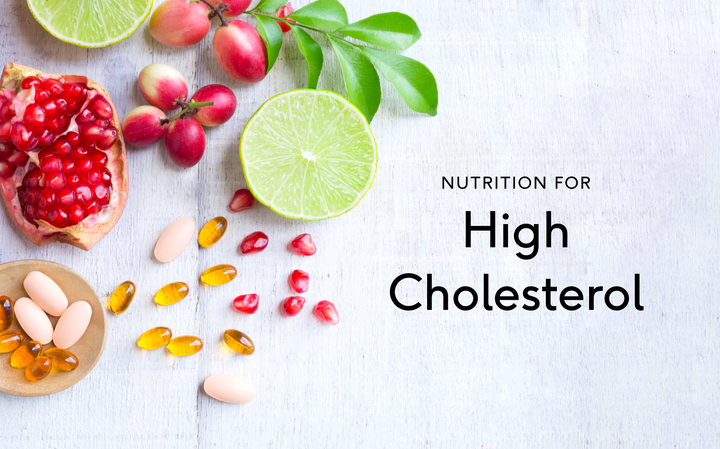Learn About Vitamin K in 5 Minutes
Table of contents

What is vitamin K?
Vitamin K, or phylloquinone, is an essential nutrient found in green, leafy vegetables. This vitamin is necessary for proper blood clotting and also supports bone health.
- Helps your blood clot better to assist in healing cuts and scrapes
- Improves bone health and development
- Prevents heart disease to improve your health and longevity
- May help with the symptoms of diabetes
Why we love vitamin K
While most people are aware that vitamin K plays a key role in blood clotting, this vitamin has several other amazing qualities that aren’t as well-known. Vitamin K appears to improve your bone health, and some sources even suggest that this substance could help you regrow tooth enamel.
This vitamin also prevents various forms of heart disease. Vitamin K may even help attenuate blood sugar levels in diabetics, and with all these incredible benefits, it’s easy to see why we just had to include your perfect daily dose of vitamin K in Feel.
Unbelievable benefits of vitamin K
Research into vitamin K is still in its infancy, so this vitamin could have benefits above and beyond those that science has discovered so far:
Cardiovascular Benefits
Vitamin K first gained popularity in the medical community due to its role in blood clotting. Further research, however, has established that this vitamin has several other cardiovascular benefits as well.
For example, vitamin K appears to improve cardiovascular health by preventing calcium buildup in the arteries. The presence of calcium in the heart and arteries leads to plaque buildup, which can cause heart failure and other chronic or potentially fatal coronary conditions.
Feel Meal Replacement includes 45μg of vitamin K1 due to its capacity to support bone strength, exercise capacity, and blood clotting.
Bone Benefits
Over 15 studies have indicated that vitamin K may improve your bone density. One study found that vitamin K helps maintain your levels of osteoprotegerin, which is integral to your bone health.
Another study found that vitamin K supplementation improved both the bone density and bone shape of post-menopausal women. Patients are commonly given vitamin K supplements after lung or heart surgery, and research found that this practice improves bone density. In addition, research indicates that people who take vitamin K are less likely to get bone fractures.
Vitamin K2 supplementation is thought to improve bone health for expecting mothers and reduce the risk of bone related pain. Feel Pregnancy includes 150μg of Vitamin K2 to ensure a healthy, comfortable pregnancy.
Diabetes Benefits
Insulin sensitivity is one of the most serious symptoms of diabetes, and one study found that supplementing with vitamin K may improve insulin sensitivity. Therefore, it’s a great idea to try supplementing with vitamin K if you have diabetes, and this vitamin may be able to prevent diabetes if you are prediabetic.
Cognitive Benefits
Vitamin K supplementation may improve the symptoms of Alzheimer’s disease. This vitamin also appears to have neuroprotective properties, which means that it prevents damage to your nerve cells. Plus, vitamin K also appears to prevent neuroinflammation, which means that it reduces inflammation in your brain and nervous system.
Vitamin K has significant roles in various physiological processes throughout the body, which is why Feel Multivitamin includes 110μg of vitamin K2, 147% of your daily recommended intake.
Is vitamin K water-soluble or fat-soluble?
Vitamin K is a fat-soluble vitamin, which means that your body takes a long time to process this nutrient. While water-soluble vitamins are excreted quickly, fat-soluble vitamins, such as vitamin K, remain in your body for a significant period of time.
Where can vitamin K be found naturally?
Phylloquinone is highly concentrated in green, leafy vegetables and a variety of other plant-based foods. This substance is also relatively plentiful in milk, eggs, and other dairy products, and it’s available in small quantities in certain fruits.
5 foods/drinks containing vitamin K
1. Natto 1000% DV per 85g
2. Collard greens 660% DV per ½ cup or 64g
3. Spinach 181% DV per 1 cup or 128g
4. Kale 141% DV per 1 cup or 128g
5. Broccoli 138% DV per ½ cup or 64g
What is the recommended daily intake for vitamin K?
The National Institutes of Health (NIH) has set the recommended daily amount (RDA) for vitamin K at 120mcg for adult males and 90mcg for adult females. This RDA does not change for pregnant or lactating females.
What to consume to get a full daily dose of vitamin K?
Natto - around 8.5g
Collard greens - around 10g
Spinach - around 1.2 cup or 64g
Around 2/3 cup or 85g
Around 2/3 cup or 85g
Can you absorb enough of vitamin K from food?
Vitamin K is relatively plentiful in a variety of plant sources, but if you don’t regularly incorporate these foods into your diet, it’s easy to become deficient in this nutrient. The only way to get enough vitamin K is to consume lots of spinach, collard greens or natto.
Why is vitamin K necessary for your body?
Vitamin K plays a key role in blood clotting; without enough of this nutrient your body may have trouble closing wounds and stopping bleeding. This nutrient is also essential for maintaining proper bone density, and it may even prevent calcium buildup in your blood vessels.
Functions of vitamin K
Blood clotting: Both the enzyme carboxylase and the protein prothrombin are dependent on vitamin K, and these substances are necessary for proper blood clotting.
Cardiovascular health: Adequate vitamin K intake appears to reduce blood calcium levels, which can keep your arteries from hardening and causing atherosclerosis and other cardiovascular conditions.
Bone density: Vitamin K is essential for proper bone metabolism, and some sources indicate that this nutrient may even assist in re-growing damaged enamel.
Neuroprotection: This nutrient appears to exert neuroprotective properties that may be able to reduce your risk of developing Alzheimer’s and other neurodegenerative conditions.
Symptoms of vitamin K deficiency
Uncontrolled Bleeding
Becoming deficient in vitamin K may cause wounds to bleed uncontrollably. Deficiency in this substance may also cause bruises to last longer, and it may prolong the time it takes to recover from surgery.
Heavy Menstruation
Due to vitamin K’s effects on blood coagulation, deficiency in this essential nutrient may lead to heavy menstruation. Losing lots of blood during menstruation can lead to temporary anemia.
Internal Bleeding
Vitamin K deficiency can lead to internal bleeding that causes bloody stool, digestive tract bleeding, and bloody urine.
How long do you need to take vitamin K to start experiencing its benefits?
As a fat-soluble vitamin it can take quite some time for you to build up adequate levels of vitamin K.
Consistency is key and our research recommends taking your Feel supplements for at least 3 months to allow your body to adjust and provide the desired benefits.
How long does it take for your body to digest/absorb vitamin K?
The absorption rate of supplemental phylloquinone is approximately 80%, but when you take this nutrient in food, the absorption rate for vitamin K drops significantly. As a fat-soluble vitamin, it can take your body more than 48 hours to fully absorb the vitamin K you consume.
How long does vitamin K stay in your body after you take it?
Vitamin K remains in your body for a period of days or weeks after you consume it.
Is vitamin K an antioxidant?
Preliminary research indicates that vitamin K may be a potent antioxidant. However, more studies need to be performed before these results can be confirmed.
Can you overdose on vitamin K?
Generally, the possibility of vitamin K overdose is considered to be minimal; there’s no evidence that consuming more than the recommended amount of phylloquinone causes any adverse effects. However, this substance can interfere with Coumadin and related medications that are designed to reduce blood coagulation. Anticoagulants like Coumadin directly target vitamin K, and supplementing with this nutrient may interfere with the action of these drugs.
Does vitamin K dissolve, flush out, or build up in the body?
As a fat-soluble vitamin, phylloquinone tends to build up in your body.
Can you take vitamin K during a diet?
There’s no reason you shouldn’t take phylloquinone during a diet. This substance doesn’t interfere with any dietary restrictions.
Are there synthetic forms of vitamin K?
A variety of synthetic forms of vitamin K have been formulated. Most of them have been proven to be inferior to genuine phylloquinone.
Why might synthetic forms of vitamin K be better?
There are no known advantages to synthetic vitamin K. In fact, one form of synthetic phylloquinone, called menadione, is so dangerous that it was discontinued for human consumption. However, menadione is still commonly used in animal feed.
Absorption rate of synthetic vitamin K
The limited research available on synthetic forms of vitamin K suggests that these supplements have inferior absorption rates.
Why might natural forms of vitamin K be better?
All evidence suggests that natural forms of vitamin K are safer, more effective, and altogether better than synthetic forms of this nutrient.
How to take vitamin K
You can consume vitamin K in supplements or consume this nutrient in food.
Vitamin K trends in medicine
Vitamin K converts to vitamin K2 in the body, and a 2019 review paper found that vitamin K2 shows significant promise in the treatment of cardiovascular conditions. In this review of the available evidence, researchers found that vitamin K supplementation may be able to solve the “calcium paradox,” which refers to the commonly-noted phenomenon of calcium supplementation improving bone density while increasing the risk of heart attack. This review concludes by suggesting that consuming calcium in tandem with vitamin K may be able to reduce the side effects of this nutrient.
Why everyone should be taking WeAreFeel supplements
Vitamin K doesn’t get the attention it deserves. While scientists are well aware that phylloquinone prevents excessive bleeding, further benefits of vitamin K are being discovered every day, and here at WeAreFeel, we’re at the cutting edge of vitamin K research.
We understand that in addition to improving your cardiovascular health, vitamin K also improves your bone density. According to some sources, this incredible nutrient may even be able to remineralise your teeth, which could be an amazing benefit for people with cavities or serious tooth decay issues. Since getting enough vitamin K in your diet can be hard when you’re too busy to eat healthy meals, you can get all the phylloquinone you need with a daily capsule of Feel!
Here’s the Proof
- Vitamin K: the effect on health beyond coagulation – an overview
- Vitamin K supplementation and progression of coronary artery calcium in older men and women.
- Vitamin K2 inhibits glucocorticoid-induced bone loss partly by preventing the reduction of osteoprotegerin (OPG).
- Vitamin K2 supplementation improves hip bone geometry and bone strength indices in postmenopausal women.
- Dietary vitamin K2 supplement improves bone status after lung and heart transplantation.
- Three-year low-dose menaquinone-7 supplementation helps decrease bone loss in healthy postmenopausal women.
- The effect of menatetrenone, a vitamin K2 analog, on disease recurrence and survival in patients with hepatocellular carcinoma after curative treatment: a pilot study.
- Effect of menatetrenone, a vitamin k2 analog, on recurrence of hepatocellular carcinoma after surgical resection: a prospective randomised controlled trial.
- Vitamin K2 Supplementation Improves Insulin Sensitivity via Osteocalcin Metabolism: A Placebo-Controlled Trial
- Low vitamin K intakes in community-dwelling elders at an early stage of Alzheimer's disease.























































 Back
Back





